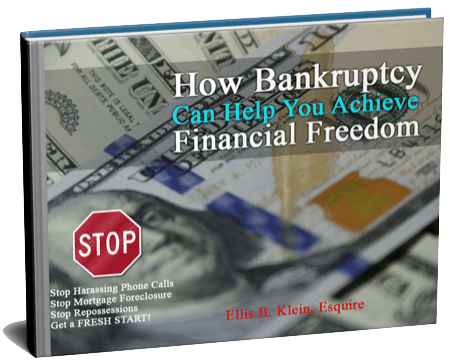District Attorney
Bankruptcy FAQ
Bankruptcy is a federal law which enables people who owe money (debtors) to be protected from their creditors’ collection activities. It is a law that helps debtors eliminate their obligation to pay back some or all of their debt, stops collection activity such as phone calls and threatening letters, stops foreclosure and repossession proceedings and gives people a fresh financial start.
Chapter 7 bankruptcy is known as a liquidation bankruptcy in which an individual wipes out all of his unsecured debt, such as credit card bills, medical bills, unsecured personal loans and utility bills just to name a few. The whole chapter 7 process takes about six months, involves one court hearing in which a trustee reviews the paperwork, and ends in a discharge in which the court enters an order legally wiping out your debt.
Chapter 13 bankruptcy is known as a repayment, or reorganization bankruptcy and involves a three or five year repayment plan of your debt. A chapter 13 bankruptcy is typically used to stop foreclosure or repossessions and allows the individual to keep the house and/or vehicle and catch up on the payments.
Many people in debt are facing harassing phone calls from their creditors calling them at home, at work, or calling family members to try to collect debts. This is an extremely stressful situation which can be stopped by filing for bankruptcy. As soon as a bankruptcy is filed, you are under the protection of the Automatic Stay of Proceedings and once your creditors are served notice of the bankruptcy they are prohibited, by law, from contacting you. Should they contact you, they can be sued in bankruptcy court which is why the phone calls will immediately stop.
Yes, as soon as the Bankruptcy is filed you are under protection of the Automatic Stay of Proceedings which means it is against the law for your creditors to contact you while you are going through bankruptcy.
If you file for a Chapter 7 liquidation bankruptcy, once the court approves the discharge then the debt no longer exists and the creditor is no longer allowed to try to collect the debt after the fact. However, if you file a Chapter 13 bankruptcy to save your house or vehicle, you are required to maintain regular monthly payments on the mortgage and/or car loan and if you fail to do so after the bankruptcy is discharged in the creditor can resume collection activity again.
Yes, in fact bankruptcy may actually help you to get credit if you cannot get credit now due to a poor credit rating. Once the bankruptcy is discharged the best way to reestablish credit is to make your regular monthly mortgage payments or car payments on time. You will also be able to get small credit cards and I always suggest to my clients charging a small amount every month and making sure to pay it back on time. Most of my clients get some sort of credit back within a year of the bankruptcy discharge.
If you file for Chapter 7 liquidation bankruptcy to wipe out your credit card and other debt, so long as you pay your mortgage is current your house cannot be foreclosed upon. If you are filing for Chapter 13 bankruptcy to save your home from foreclosure, so long as you make your regular monthly mortgage payments plus the catch-up payment to the bankruptcy court than the mortgage company cannot go to foreclosure.
Nothing can be more stressful than the thought of losing your home in a Sheriff Sale. Filing for Chapter 13 bankruptcy will allow you to keep your home and catch up on your mortgage arrears. As soon as the bankruptcy is filed you are under protection of the automatic stay of proceedings which automatically stops the sheriff sale. So long as you make your regular payments to the mortgage company and the catch-up payment to the bankruptcy court the house cannot go to sheriff sale.
There is a minimum of one hearing which you will be required to attend and is known as a Meeting of Creditors in which a bankruptcy trustee, who is a lawyer employed by the bankruptcy court, will review the bankruptcy petition and ask you to verify some information such as income and expenses. Most cases this is the only hearing that you will have to attend but there can be other hearings scheduled in certain circumstances.
Generally speaking, taxes are not dischargeable through a Chapter 7 bankruptcy. However, if you file a Chapter 13 bankruptcy, any tax debt owed to the government can be repaid over three or five years. In many situations the amount of debt repaid will be less than what is owed as some late fees and other fees do not get repaid in the bankruptcy and are wiped out. Additionally, once you are finished repaying the tax debt, any remaining unsecured debt such as credit cards medical bills and other debts are discharged (wiped out) by the Bankruptcy Court.
If you are facing a wage garnishment by the IRS, filing for bankruptcy places you under protection of the automatic stay of proceedings which will stop any wage garnishment.
Filing for Chapter 7 bankruptcy will stop the lawsuit if you file the bankruptcy before the creditor get a judgment against you in court. Any debt associated will be discharged, wiped out by court order.
If the creditor has sued you in court and obtained a judgment they now are permitted to collect on the judgment which is usually by way of a sheriff sale of your personal property and also could lead to freezing any bank accounts that you have in your name. Filing Chapter 7 will stop all collection activity and the judgment against you can be avoided in bankruptcy court. At the end of the Chapter 7 bankruptcy the court enters an order discharging all of your debt and voids the court judgment against you.
Even if you have a nice income, you still can be eligible to wipe out all of your debt through a Chapter 7 bankruptcy as long as you pass the means test. The means test looks at your monthly income and monthly expenses so even if you have a high income it will take into account any mortgage payments, car loan payments and other cost of living expenses. If you pass the means test then you are eligible for Chapter 7 to wipe out all of your debt. If you “fail” the means test, you would be required to file for Chapter 13 bankruptcy to pay back some or all of your debt over three or five years. In this situation, many clients are only paying a portion of their debt with any remainder getting discharged at the end of the repayment plan.
If a family member cosigned a loan for you, such as a car loan or credit card, the creditor can still try to collect the debt from the cosigner. You would be protected from collection activity through bankruptcy but your cosigner would not.
You can choose to surrender your vehicle and not be required to pay for it in a “voluntary surrender.” The property will eventually be sold at sheriff sale or auction and if the sale price is less that what it owed on the property, you cannot be forced to repay the deficiency if your bankruptcy is discharged.
If you simply cannot afford your regular mortgage payments, you can choose to surrender your home and not be responsible for any debt associated with it by filing for Chapter 7. For instance, if you surrender your home and you owe $100,000 on it and it sells at auction for $50,000, unless you file for Chapter 7 Bankruptcy, you will be responsible for the $50,000 deficiency. You will not be responsible for any deficiency if you receive a Chapter 7 discharge.
Chapter 7 bankruptcy can be filed again if more than eight years has elapsed from the date the discharge was received on the previous case. For Chapter 13 bankruptcy, if a repayment plan was not completed and was dismissed there is no time limit to file again. This situation typically arises in a mortgage foreclosure situation where the homeowner cannot remain current on his payments. The court will eventually dismiss the case and foreclosure beings again. An individual in this situation may file another chapter 13 bankruptcy to try again to become current on his mortgage.
No, all debt must be put into the bankruptcy and you cannot show a preference as to who gets paid and who does not. However, once the bankruptcy is discharged, you should be eligible for small lines of credit which is a good way to reestablish your credit rating.
The short answer is yes, it will affect your credit rating because it will appear on your credit report. Filing for bankruptcy can certainly affect future loan eligibility. However, if your current credit rating is poor, bankruptcy may actually help you to re-establish good credit. Most clients within a year of the discharge are able to get some sort of credit, typically with credit cards with small lines of credit. Over time, if you make all payments on time, your credit rating may actually be better than it was before you filed for Bankruptcy.
Bankruptcy will remain on your credit report for up to 10 years.
Don’t be embarrassed. Bankruptcy is a law that was put into place to protect people from their creditors. It is a legal way to wipe out or reorganize your debt. Millions of people take advantage of this law every year. People lose jobs, get sick, or just simply accrue too much debt to be paid back. If you call us for a free consultation, we promise to treat you with kindness and respect. We treat our clients the way we would want to be treated if we were experiencing legal problems. In fact, many of my clients after their cases ended have told me that they wished they contacted me to file for Bankruptcy years ago.
Call Us to See How We can Help!
Call one of the experienced attorneys at Ellis B. Klein & Associates for a free consultation. We have helped thousands of clients get a fresh financial start over the last 20+ years in practice. We will gladly answer all of your questions and we will even quote you a fee and a flexible payment plan right over the phone. Stop the harassing phone calls, stop the stress and achieve financial freedom.

Stop Harassing Phone Calls
Stop Mortgage Foreclosure
Stop Repossessions
Stop Utility Shutoffs
Ellis B. Klein & Associates
Helping people achieve financial freedom since 1999.
Put our experience to work for you.
Call or email us for a FREE CONSULTATION










